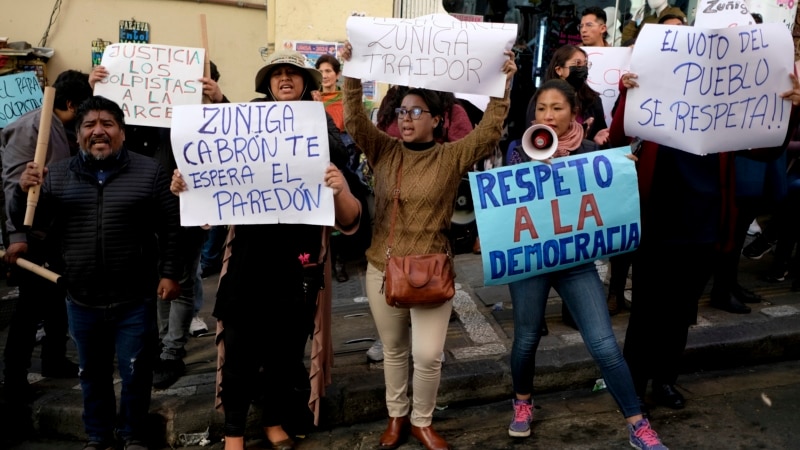Suspected leaders of failed Bolivian coup remanded in custody

La Paz, BOLIVIA — Three suspected leaders of a failed coup against Bolivian President Luis Arce were remanded in custody on Friday for six months, the country's top prosecutor said.
Former army chief Juan Jose Zuniga, former head of navy Juan Arnez, and Alejandro Irahola, former head of the army's mechanized brigade, will be held in a high-security prison not far from the capital, La Paz.
"This pretrial detention ordered by the judge will undoubtedly set a precedent and is a good signal for the investigation to move forward," said Attorney General Cesar Siles.
The three officers face charges of engaging in an armed uprising and terrorism and face up to 20 years in prison, Siles said on state television.
A total of 21 active, retired and civilian military personnel were arrested in connection with Wednesday's attempted coup, in which troops and tanks were deployed in the heart of the capital, where they tried to break down a door of the presidential palace.
Zuniga said his goal was to "restructure democracy" in Bolivia. He was soon captured, and the troops pulled back.
In an unusual twist, Zuniga claimed he was following Arce's orders and that the president had hoped for the coup to trigger a crackdown that would boost his popularity.
Arce denied the allegations. "How could one order or plan a coup on oneself?" he told reporters.
Tensions in the Andean nation have been rising in recent weeks over surging prices, shortages of dollars and fuel, and a feud between Arce and powerful former president Evo Morales ahead of the 2025 election.
Brazilian President Luiz Inacio Lula da Silva announced Thursday that he would soon visit his Arce to support him following the unrest.
Russia "strongly" condemned the attempted military coup, its foreign ministry said Thursday, warning against "destructive foreign interference" in the South American country.
United Nations chief Antonio Guterres "welcomes the peaceful resolution of the situation," his spokesperson, Stephane Dujarric, said, having earlier expressed alarm over the abortive coup.
Condemnations of the coup bid also poured in from Madrid, Washington and across Latin America.
Bolivia, which has a long history of military coups, has in recent weeks been rocked by an economic crisis due to a drop in natural gas production, its main source of foreign currency until 2023.
The country has had to reduce fuel imports, and there is a shortage of dollars, which has triggered protests by powerful unions of merchants and freight transporters.
Gustavo Flores-Macias, a professor of government at Cornell University in New York, told AFP the failed coup was "a symptom of a significant and broad discontent" in the country.
For now, "we must carefully evaluate how widespread the discontent is within the armed forces," he said, adding that Arce's government was facing "a critical moment of weakness."
Bolivia is also deeply polarized after years of political instability, and the ruling Movement Towards Socialism party is riven by internal conflict between supporters of Arce and his former mentor, Morales.
